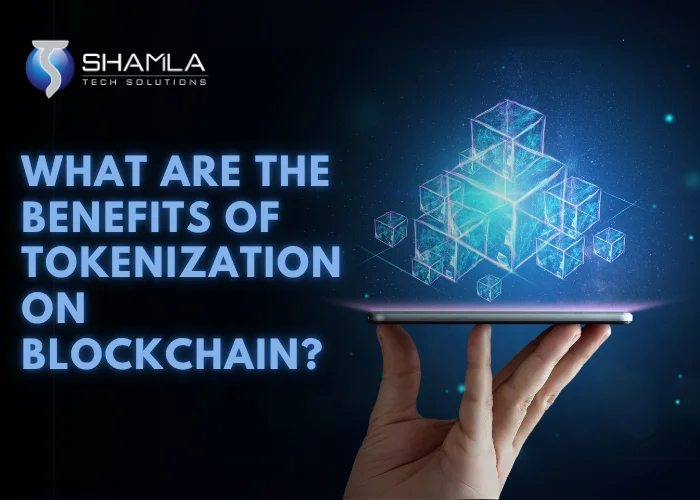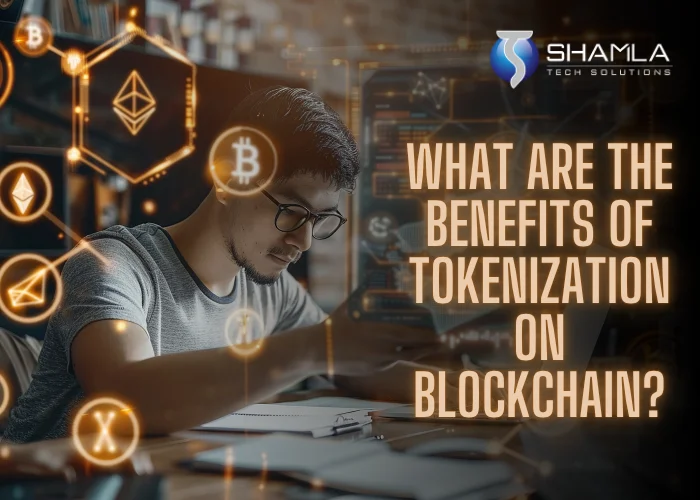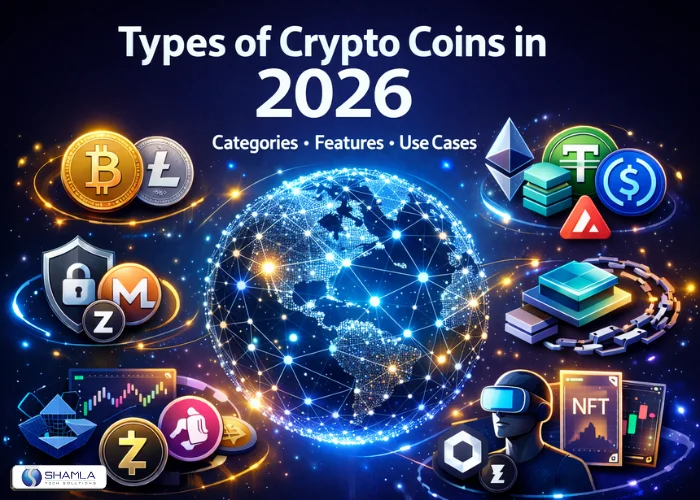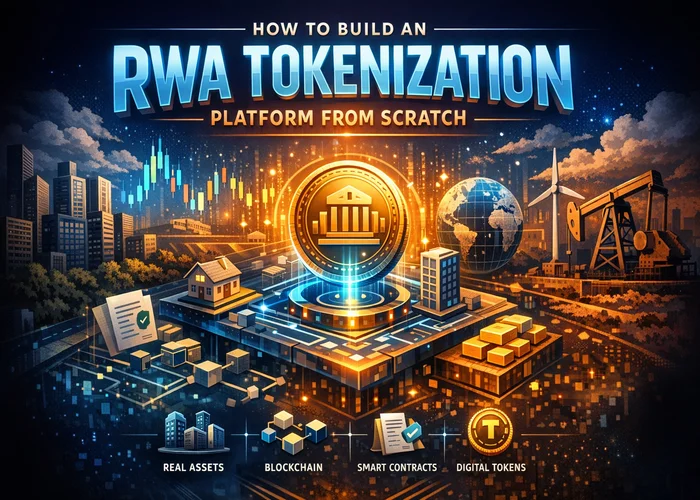Understanding Tokenization on Blockchain
The benefits of tokenization in real-world assets is the process of turning ownership rights to real or digital assets into cryptographic tokens. These tokens can stand for anything, such real estate, art, goods, stocks, intellectual property, or even elements in a game. When these assets are tokenized, they can be programmed, split up, and sent immediately. This opens up a lot of new opportunities for investors, asset owners, and the economy as a whole.
1. Enhanced Liquidity: Unlocking Trapped Value
2. Fractional Ownership: Democratizing Investment
3. Global Accessibility and Financial Inclusion
4. Increased Transparency and Security
One of the best things about the benefits of tokenization on blockchain is how safe and open blockchain technology is. The blockchain keeps a permanent record of every transaction, change of ownership, and token transfer, making it impossible to change and easy to check.
This transparency:
- Lessens fraud, counterfeiting, and spending twice
- Makes it easy to check who owns something and where it came from
- Gives investors and asset owners more faith in each other
Real estate tokenization has many benefits, including as clear, unchangeable records of property ownership and transaction history, which makes due diligence easier and lowers the number of conflicts.
5. Efficiency and Cost Reduction
Tokenization on the blockchain makes many operations that used to be done by hand and cost a lot of money easier and faster. Smart contracts and the benefits of tokenization on blockchain make it possible to automatically transfer assets, check for compliance, and distribute revenue, which cuts down on the need for middlemen and paperwork.
In this case, tokenization on the blockchain has the following benefits:
- Less money spent on transactions and administration
- Settlements happen faster, sometimes right away or almost right away.
- Less risk of making mistakes and less risk of dealing with the other side
For instance, blockchain-based real estate tokenization does away with the need for brokers, escrow agents, and notaries because smart contracts take care of the terms of sale and ownership transfer on their own.
6. Programmability and Automation via Smart Contracts
Tokenization and smart contracts work well together. Smart contracts are pieces of code that run on the blockchain and automatically enforce the rules for asset ownership, transfer, and compliance without any help from anyone.
Smart contracts and Benefits of tokenization on blockchain:
- Automated distribution of rental or dividend income
- KYC/AML compliance on the blockchain and whitelisting of eligible investors
- Instant and trustless settlement of trades
This automation not only cuts expenses, but it also makes the market more efficient and reliable.
7. Lower Barriers to Entry and Diversification
Benefits of tokenization on blockchain makes it easier for both investors and asset owners to get involved by allowing fractional ownership and worldwide access. Investors can spread their money over a wide range of asset classes, locations, and levels of risk without having to spend a lot of money.
Advantages of tokenizing real-world assets:
- More people can take part in markets like real estate, commodities, and art.
- Improved risk management through spreading out investments
More ways for asset owners to make money
8. Enhanced Liquidity for Real Estate and RWAs
Tokenizing real estate on the blockchain is a huge step forward for property markets. Real estate is usually illiquid, which means it can take months to sell a property and the minimum investment amounts are considerable. Benefits of tokenization on blockchain makes it possible for
- Fractional ownership and simple transfer of property shares
- Transactions that are faster and cheaper
- Trading real estate tokens on the secondary market
RWA Tokenization in Real Estate Investment lets you buy, sell, or use assets as collateral in real time, making real world asset tokenization development as easy to trade as stocks or bonds.
9. Improved Compliance and Regulatory Integration
Modern asset tokenization platforms may add compliance capabilities right into smart contracts, making sure that all transactions follow the rules and laws. This includes:
- KYC/AML checks on the blockchain
- Transfers to accredited investors that are on the whitelist
- Tax and reporting systems that run on their own
Benefits of tokenization on the blockchain has benefits including lower regulatory risk, faster audits, and easier compliance across borders.
10. Transparency, Auditability, and Trust
Blockchain’s unchangeable ledger makes sure that every action, whether it’s issuing, transferring, or redeeming tokens, is recorded and can be checked. This openness makes everyone, from investors to regulators, trust each other more.
Tokenizing assets in this region has the following benefits:
- Transaction and ownership history that is easy to check
- Less likely to have problems or fraud
- Asset issuers will have a better reputation
11. Composability and Integration with DeFi
You may add tokenized digital assets to the decentralized finance (DeFi) ecosystem, which opens up new ways to use them and make money. For instance:
- You can use tokenized real estate as collateral for DeFi loans.
- You can trade tokenized goods on decentralized exchanges.
You can use programmable tokens to manage your assets automatically by having them work with other smart contracts.
Benefits of tokenization on the blockchain makes assets that were once separate more useful and able to work with other assets.
12. Faster, Cheaper, and More Efficient Transactions
Transferring assets the old-fashioned way can take a long time, cost a lot of money, and make mistakes. Tokenization makes transactions happen very instantly and at a cheap cost, which makes markets more flexible and less frictional.
Advantages of tokenizing on the blockchain:
- Trading and settling 24 hours a day, seven days a week
- Less reliance on middlemen means lower fees
Fewer mistakes and speedier reconciliation.
13. Global Investment Opportunities and Market Expansion
Tokenization makes it possible for investors to invest in assets from all over the world without having to worry about regional or regulatory issues. This opens up new markets for asset owners and gives them more chances to grow and diversify.
Three Benefits of tokenization on blockchain:
- Access to markets and assets around the world
- More competition and lower prices
More investment and growth in the economy
14. Enhanced Security and Fraud Reduction
Tokenized assets are very safe since blockchain uses cryptography to protect them and keeps records that can’t be changed. There is almost no fraud, counterfeiting, or double-spending, and code, not simply paper contracts, protects ownership rights.
Three Benefits of tokenization on blockchain:
- Records that can’t be changed and safe transactions
- Less chance of theft or forgery
Investors and asset owners are more sure in themselves.
15. Lower costs of doing business and more efficient operations
Tokenization lowers transaction costs and makes operations more efficient by automating tasks and cutting down on the need for middlemen. This is especially important in fields like real estate, where transactions take a long time and cost a lot of money.
Advantages of tokenizing real estate:
- Less money for buyers and sellers
- Transactions that go faster and are more efficient
Easier handling of assets.
16. New Revenue Streams and Business Models
Benefits of tokenization on blockchain opens up new ways for asset owners, platforms, and investors to make money and do business. For instance:
- Tokenized assets can pay fees or dividends to their owners.
- Platforms can provide new financial goods and services.
- Tokenized assets can let investors make money with DeFi protocols.
Benefits of tokenization on blockchain makes financial markets more flexible and open to new ideas.
17. Potential for Secondary Market Trading
Investors who want to sell their tokenized assets before they mature can do so on secondary markets. This gives them liquidity and exit choices. This makes tokenized investments more flexible and appealing.
Benefits of tokenization on blockchain:
- Markets that are more liquid and prices that are easier to fine
- Asset owners have an easier time getting money.
18. Compliance and Regulatory Advantages
Benefits of tokenization on blockchain on the Ppatforms for asset tokenization can add compliance elements directly into smart contracts. This makes sure that transactions follow the rules imposed by the government. This can make it easier for those in the market to follow the rules and lower the danger of breaking them.
Challenges to Tokenization
How security tokens will remain tied to their underlying assets is another regulator issue. What happens when thousands of anonymous investors buy a tokenized hotel and decide who maintains and operates it? What if an asset-backed token’s gold reserves disappear? Tokenizing digital assets offers decentralized, trustless value transfers, while physical asset tokenization may still require centralization and third-party involvement.
Conclusion
The Transformative Benefits of Tokenization on Blockchain
Benefits of tokenization on blockchain has several deep and wide-ranging benefits and asset tokenization platform benefit investors. Tokenization is changing how we own, trade, and invest in assets by making them more liquid, allowing fractional ownership, and making them accessible, clear, and safe around the world. The future is digital, programmable, and decentralized, whether it’s the benefits of real estate tokenization on blockchain, smart contracts and tokenization, or the bigger benefits of blockchain tokenization for investors and asset owners.
The benefits of asset tokenization on blockchain will become clearer as more people use it and platforms get better. It will make finance more accessible, unlock value, and open up new opportunities for everyone. There are many possible benefits for anyone who are willing to accept this new era.
Connect with Shamlatech today to tokenize your assets on Blockchain









